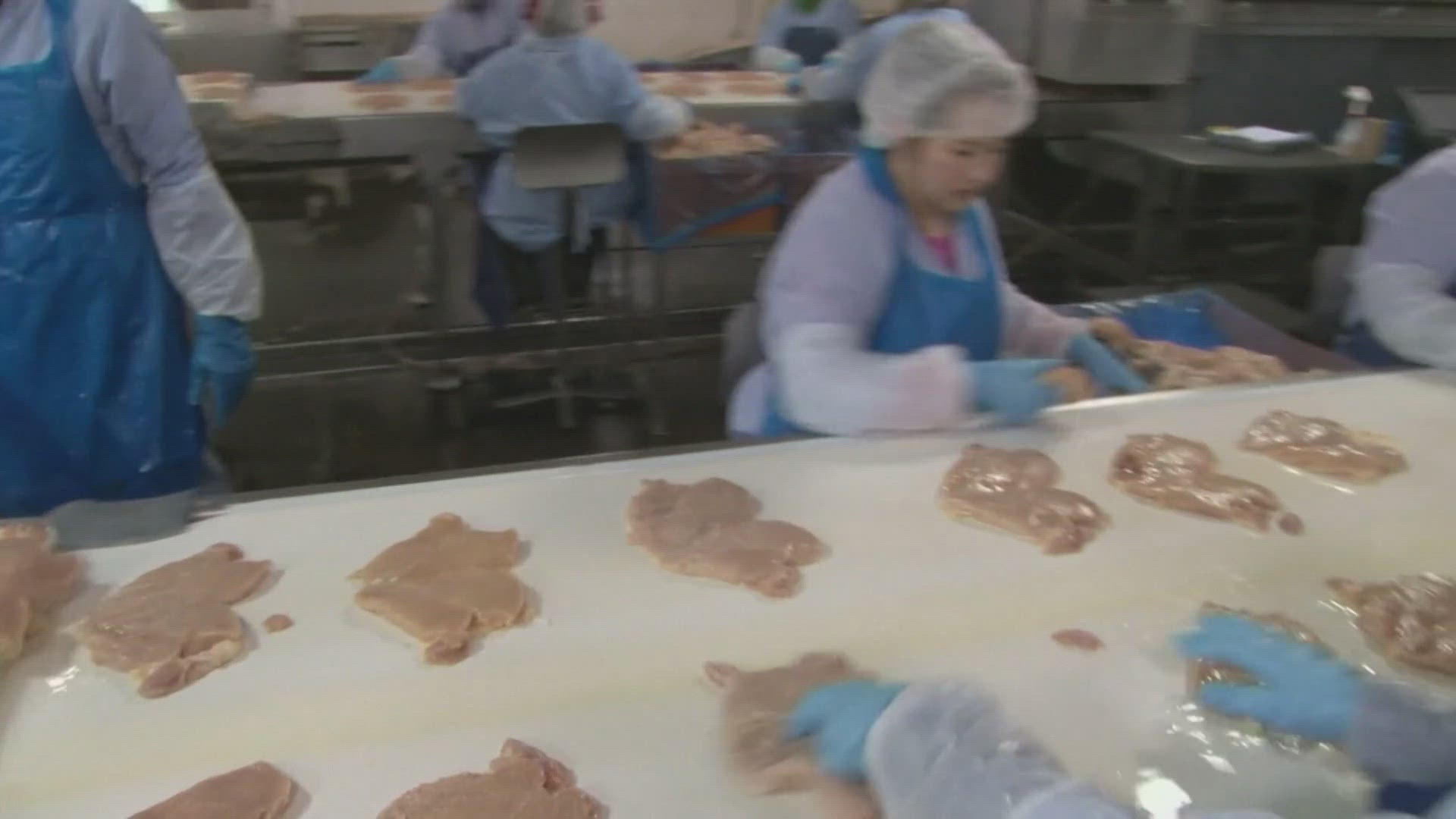MISSOURI, USA — It takes literal tons of water to make hamburgers, hot dogs and chicken nuggets, according to United Nations data.
According to the United Nations, Agriculture uses around 72% of the world's freshwater withdrawals. Animal meat production accounts for nearly one-third of that freshwater consumption, according to research commissioned by animal welfare organization Compassion in World Farming.
Meat processors pump a portion of that water, along with pounds of toxic pollutants, directly back into the rivers, streams and lakes it came from, according to Environmental Protection Agency (EPA) reports. The meat industry's water usage generates millions of gallons of wastewater and is one of the largest sources of industrial nutrient pollution in the country, damaging human and environmental health.
Tyson Foods dumped more than 371 million pounds of pollutants directly into the nation's waterways between 2018 and 2022, a large chunk of which were in Illinois and Missouri, according to a recent report from the Union of Concerned Scientists.
The Union of Concerned Scientists is an advocacy group of researchers, policy experts, advocates and others with a mission statement that reads: "The Union of Concerned Scientists puts rigorous, independent science into action, developing solutions and advocating for a healthy, safe, and just future."
The nonprofit's report analyzed publicly available data from the EPA to break down the extent of Tyson's water pollution.
How many pollutants did Tyson dump into Missouri and Illinois water?
The report said that Tyson dumped 52.7 million pounds of pollutants into Illinois waterways and 48.6 million pounds of pollutants into Missouri waterways, which account for 14% and 13% of Tyson's total waterway pollution in the United States. Nebraska was the only state with more Tyson pollution at 111.2 million pounds, according to the report.
The Tyson Fresh Meats facility in Joslin, Illinois, and multiple Tyson plants in Missouri communities including Dexter, Monett, Noel and Sedalia contributed to the states' high pollution numbers, the report said.
"Tyson's water pollution includes nitrogen and phosphorus that can deplete water oxygen, animal parts and byproducts like blood and feces, and pathogens like E. coli and Enterococcus," the Union of Concerned Scientists said on its website. "Previous research found that almost 75% of water-polluting meat processing facilities are located within one mile of communities of 'demographic or environmental characteristics of concern'—that is, communities where people live with more pollution, less power, and worse health compared to other areas of the United States."
The researchers expect the report's findings to be only a small fraction of the meat industry's total water pollution, as the report didn't take water pollution from concentrated animal feeding operations, agriculture feed sources and fertilizer runoff into account.
Are the report's findings legitimate?
Jason Knouft, a St. Louis University professor of biology and principal investigator for SLU's WATER Institute, said he believed the data shared in the report was relatively accurate based on EPA reports. He also said that the pollution from meat processors greatly impacts water quality, fishing industries and the nation's food supply chain.
"This is a broader issue, not just a Tyson issue," Knouft said. "It's an industry-wide problem that we need to do a better job of dealing with so other components of our economy don't bear the cost. At the end of the day, it's not fair for other people to bear the cost or other industries to bear the cost of what the meat processing industry is doing."
A Tyson Foods spokesperson sent the following statement to 5 On Your Side in response to the report:
“Tyson Food uses a robust management system to mitigate environmental risks and impact, and we strive to run our operations as responsible stewards of our natural resources. We consistently monitor effluent from our facilities, and we work closely with our federal and state regulators, as well as our local municipalities, as we plan, design, and operate our wastewater systems. This report does not acknowledge our ongoing compliance with EPA regulations and certification by the Water Alliance for our strong water management practices. Our longstanding treatment program protects the environment and the interests of water across our nation, along with ensuring resiliency of the food system.”
Top St. Louis headlines
Get the latest news and details throughout the St. Louis area from 5 On Your Side broadcasts here.

